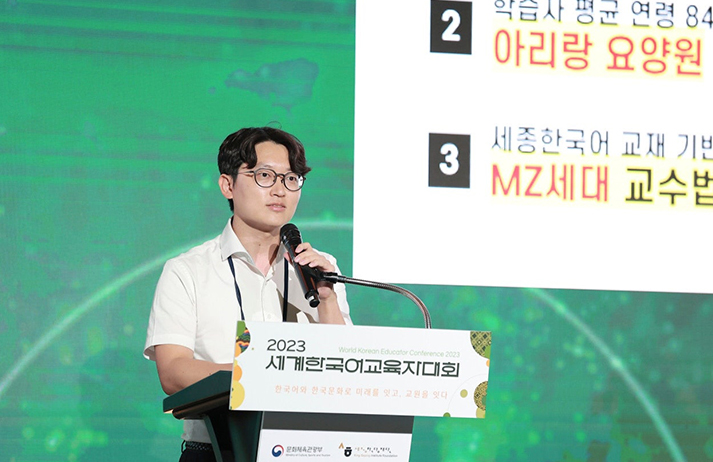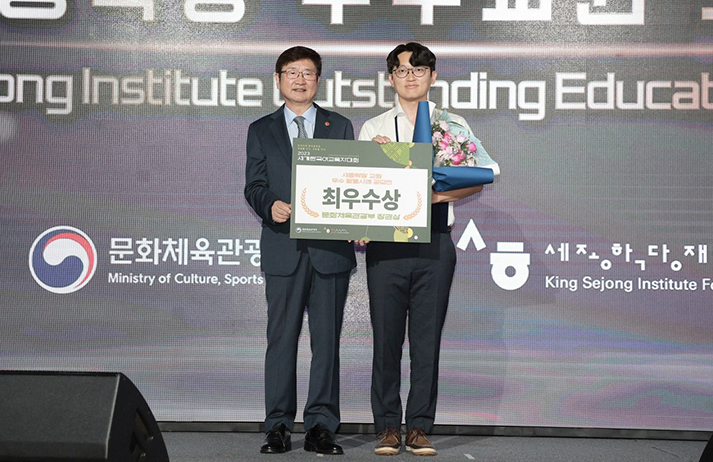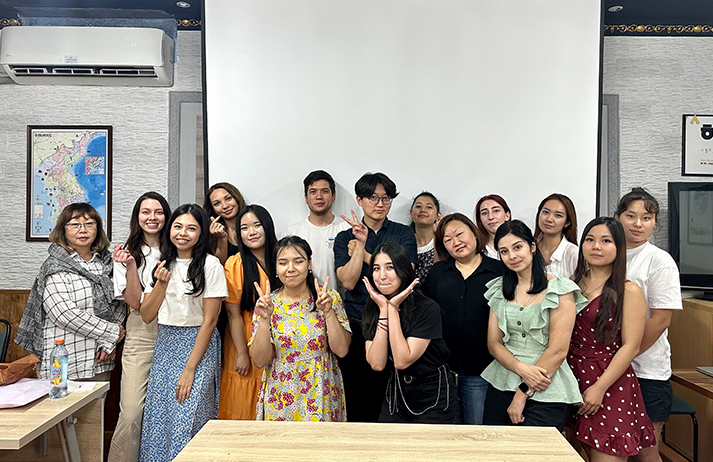

Interview with Instructor Kim Yeon-woong,
who won the Minister of Culture, Sports and Tourism Award at the Outstanding Instructor Contest during the 2023 World Korean Educators Conference
The 2023 World Korean Educators Conference held in Seoul for four days from August 7 to 10, brought together a gathering of Korean instructors from all over the world. Let"s first meet Instructor Kim Yeon-woong of KSI Tashkent 1, Uzbekistan, who received the Minister of Culture, Sports and Tourism Award at the Outstanding Instructor Contest on the first day of the conference.
Good morning, Mr. Kim Yeon-woong. First of all, please tell us about yourself for the readers of Monthly Knock Knock.
Hello! I am Korean instructor Kim Yeon-woong. I would like to introduce myself as “an instructor created by KSI.” After graduating with Russian and English majors at Kyungpook National University in 2016, I wandered around the world trying to find the job I would do for a living, before getting to work at KSI. I started in 2017 as a local instructor in KSI Bishkek, Kyrgyzstan, and in 2020, I worked as a dispatched teacher at the KSI Korean Cultural Center, Egypt. Currently, in 2023, I am working as a localized Korean teacher at KSI Tashkent 1, Uzbekistan. Come to think of it, I have already been working at KSI for seven years since graduating from college!
We heard that you have taught Korean language classes at Arirang Nursing Home in Tashkent, for elderly Koreans since this February. What made you start it?
Our president, Heo Seon-haeng, has been planning an education project that sends professional Korean teachers to Arirang Nursing Home for lengthy assignments. He has finally signed a memorandum with the Korea Foundation for International Healthcare this year, but he seemed to be stressed about which teacher to send for the classes. At the time, I had a desire to teach Korean in a different environment, interacting with new students. Most of all, I had visited Arirang Nursing home in the past as a member of the KOICA Volunteer Group, so I volunteered with excitement at the thought of seeing those elderly folk again.
I heard that you also operate a YouTube channel for Korean learners who are Russian speakers. I wonder how you started this YouTube project?
I set up an Instagram account to communicate with KSI learners. When I returned to Korea in 2018 after teaching in Kyrgyzstan, I used to show the KSI learners what life was like in Korea through Instagram live while working as an English teacher. I also, for fun, uploaded material to Instagram, and YouTube animations that would help them learn Korean, such as “a story of a Russian tough guy and a native Busan lady having a fling. These contents went viral among Russian-speaking Korean learners, and the number of subscribers increased to 5,000 very quickly, and then finally reached 30,000. I think they liked seeing a Korean who understands their language, culture, and sense of humor teaching Korean through a new medium. Recognizing this as an opportunity, I decided to become a Korean educator.

You received the Minister of Culture, Sports, and Tourism Award at the Outstanding Teacher Contest for 2023 World Korean Educators Conference. Please tell us about the award-winning presentation “KSI Tashkent 1, connecting the MZ-generation and 80-year-olds through Korean language and culture,” which you gave on the first day.
I tried to tell them the story of students at KSI Tashkent 1, who were connected by Korean language and culture, regardless of their age. I wanted to show the teachers around the world the elderly Korean people, whose average age is 84, learning consonants and vowels, learning words with video word cards, singing along to Korean folk songs, and writing letters. I was very proud of the elderly people who proved that age does not matter if you have the passion for learning.
I also introduced a teaching method to get closer to the MZ Generation, who comprise the majority of KSI learners. I shared videos of students who practice speaking and writing through media that are familiar to young learners, such as YouTube shorts and social media activities. I tried to show them the learners in their teens and 20s who display their skills in Korean if the teachers allow them to. I was very grateful for the positive feedback from many teachers.
How did you feel when you were announced as a winner?
I have not received many awards in my life, so I was very surprised when I got the Minister’s award. I first broke the happy news to my parents, and thanked the KSI president for giving me the opportunity to show my competence. There weren"t any particular difficulties in preparing for the presentation, but I did not have many videos or photos of the classes for Korean seniors. So one day, I asked two of my colleague instructors to film a day of classes at the nursing home. The video was too long to use at the presentation, but I was happy to have a video of a fruitful day with my colleagues.
On the same day, you also participated in the talk concert with KSI learners and Korean instructors under the theme of “Dreams of future generations through Korean.” I wonder what kind of experience that was for you.
I first received the stories of the participants in the talk concert in scripts. Though we all have different nationalities and appearances, I felt a sense of closeness with them for having the same experiences through KSI. Sure enough, although I had never met them before, they felt like students, fellow instructors, and KSI presidents I hadn’t seen in a long time. Until we appeared on the stage, we talked about the KSI around the world and empathized with each other. I believe the people who heard of their stories through the concert would think the same, too. It was wonderful to see that I could communicate with people from all over the world, using the same language and feeling the same thing through KSI.
What is the most rewarding for you in working as a Korean educator at KSI?
As a member of KSI, I feel very rewarded when I see students pursuing their dreams through learning Korean at KSI and devoting themselves toward furthering those dreams even after KSI.
Allow me to tell you a story about a Korean student whom I taught in KSI Bishkek, Kyrgyzstan, seven years ago when I first taught at KSI. She was talented in painting, but gave up her dream of art and majored in language because of her family circumstances. I found that she was very talented when I saw her making props such as gat (Korean noblemen’s hats), and policemen’s tridents, while preparing for the play Chunhyangjeon. I felt very sad that the only thing I could do for her was to teach her Korean as a Korean instructor.
Then, three years later, this same student brought me some good news. She told me that she had been selected as a scholarship student invited by the Korean government, and was going to go to a leading Korean university as a design major. Now, she has obtained a master’s degree, and works as a social influencer, running an Instagram introducing her life in Korea and her art activities in Korean. Through witnessing such students achieving their goals through Korean, I realized that KSI had the power to make the people around the world realize their dreams, and I felt so proud of being a member of KSI.

Finally, please could you tell us if you have any goals or plans related to Korean education?
My goal is to become a teacher who can teach Korean interpretation and translation courses. When I see the textbooks for the interpretation and translation courses that KSIF is designing, I want to teach with those books. However, I only majored in Russian and English at the undergraduate level at university. I cannot even think about it because I lack the knowledge or the experience in interpretation and translation. I am developing my linguistic competence through language exchange with students. After this dispatch period, I would like to take on the challenge for a master’s degree in interpretation and translation. In the future, I would like to become a professional bilingual teacher who can teach from beginner learners who are Russian and English speakers, to advanced learners in interpretation and translation.